Psychosocial Development: Andrew's Case Study Analysis
VerifiedAdded on 2022/10/31
|9
|2298
|192
Essay
AI Summary
This essay analyzes the psychosocial development of Andrew, a 2.5-year-old toddler, based on a provided case study. It explores the significance of psychosocial development, particularly within Erikson's stages, focusing on the 'Autonomy vs. Shame and Doubt' stage and how parental and caregiver support influences a child's sense of independence and self-esteem. The essay examines factors affecting Andrew's development, including his communication skills, toileting habits, and eating patterns, highlighting the impact of working parents and childcare arrangements. It proposes strategies to support Andrew's development, such as peer interaction, parental involvement, and caregiver support. The essay emphasizes the importance of creating an environment that fosters initiative, independence, and healthy habits, underscoring the crucial role of parents, caregivers, and peers in shaping a toddler's psychosocial well-being. The essay concludes by reiterating the essential role of psychosocial development in a toddler's personality formation and the need for supportive environments.

Running head: HUMAN RELATIONSHIPS AND LIFE TRANSITIONS
Name of the student:
Name of the university:
Author note
Name of the student:
Name of the university:
Author note
Paraphrase This Document
Need a fresh take? Get an instant paraphrase of this document with our AI Paraphraser
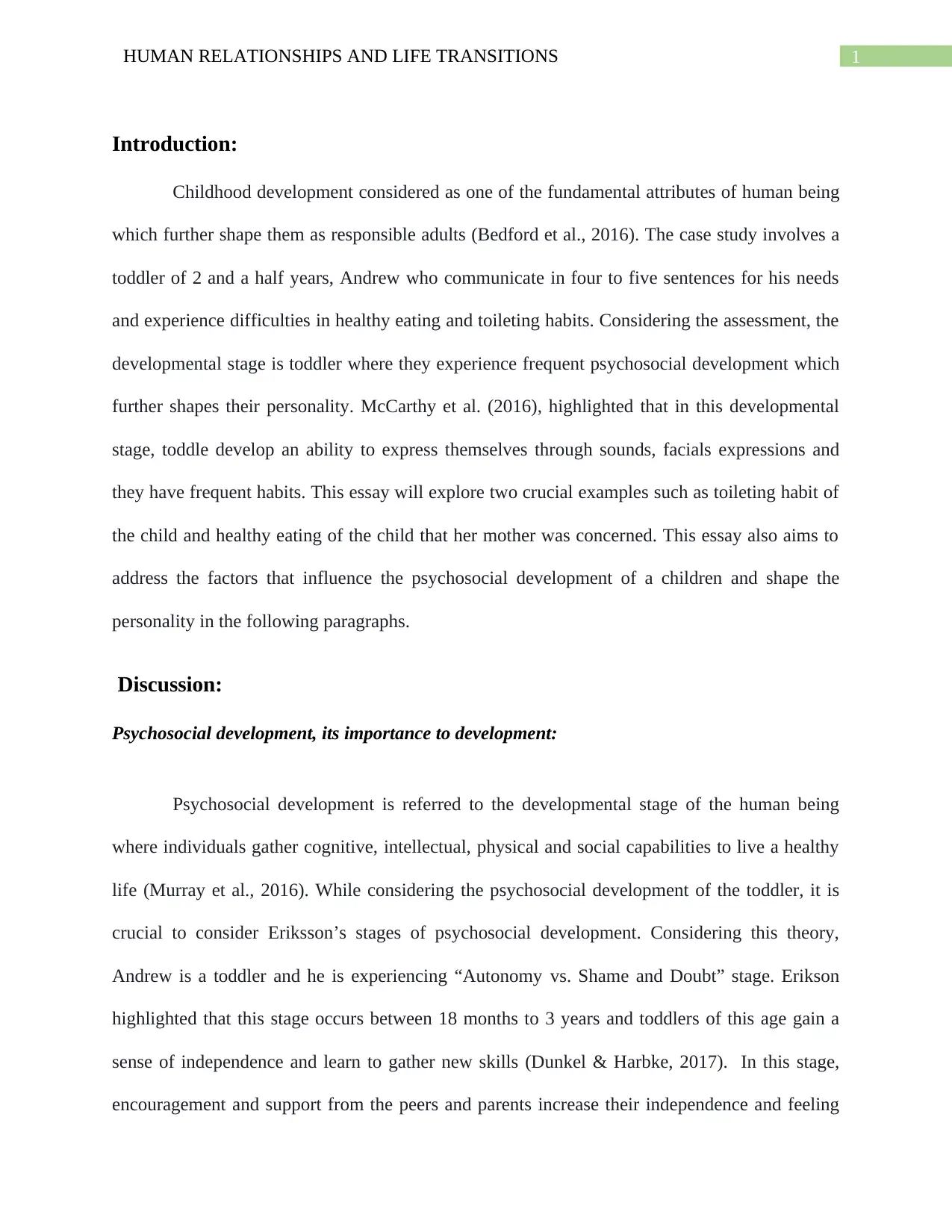
1HUMAN RELATIONSHIPS AND LIFE TRANSITIONS
Introduction:
Childhood development considered as one of the fundamental attributes of human being
which further shape them as responsible adults (Bedford et al., 2016). The case study involves a
toddler of 2 and a half years, Andrew who communicate in four to five sentences for his needs
and experience difficulties in healthy eating and toileting habits. Considering the assessment, the
developmental stage is toddler where they experience frequent psychosocial development which
further shapes their personality. McCarthy et al. (2016), highlighted that in this developmental
stage, toddle develop an ability to express themselves through sounds, facials expressions and
they have frequent habits. This essay will explore two crucial examples such as toileting habit of
the child and healthy eating of the child that her mother was concerned. This essay also aims to
address the factors that influence the psychosocial development of a children and shape the
personality in the following paragraphs.
Discussion:
Psychosocial development, its importance to development:
Psychosocial development is referred to the developmental stage of the human being
where individuals gather cognitive, intellectual, physical and social capabilities to live a healthy
life (Murray et al., 2016). While considering the psychosocial development of the toddler, it is
crucial to consider Eriksson’s stages of psychosocial development. Considering this theory,
Andrew is a toddler and he is experiencing “Autonomy vs. Shame and Doubt” stage. Erikson
highlighted that this stage occurs between 18 months to 3 years and toddlers of this age gain a
sense of independence and learn to gather new skills (Dunkel & Harbke, 2017). In this stage,
encouragement and support from the peers and parents increase their independence and feeling
Introduction:
Childhood development considered as one of the fundamental attributes of human being
which further shape them as responsible adults (Bedford et al., 2016). The case study involves a
toddler of 2 and a half years, Andrew who communicate in four to five sentences for his needs
and experience difficulties in healthy eating and toileting habits. Considering the assessment, the
developmental stage is toddler where they experience frequent psychosocial development which
further shapes their personality. McCarthy et al. (2016), highlighted that in this developmental
stage, toddle develop an ability to express themselves through sounds, facials expressions and
they have frequent habits. This essay will explore two crucial examples such as toileting habit of
the child and healthy eating of the child that her mother was concerned. This essay also aims to
address the factors that influence the psychosocial development of a children and shape the
personality in the following paragraphs.
Discussion:
Psychosocial development, its importance to development:
Psychosocial development is referred to the developmental stage of the human being
where individuals gather cognitive, intellectual, physical and social capabilities to live a healthy
life (Murray et al., 2016). While considering the psychosocial development of the toddler, it is
crucial to consider Eriksson’s stages of psychosocial development. Considering this theory,
Andrew is a toddler and he is experiencing “Autonomy vs. Shame and Doubt” stage. Erikson
highlighted that this stage occurs between 18 months to 3 years and toddlers of this age gain a
sense of independence and learn to gather new skills (Dunkel & Harbke, 2017). In this stage,
encouragement and support from the peers and parents increase their independence and feeling
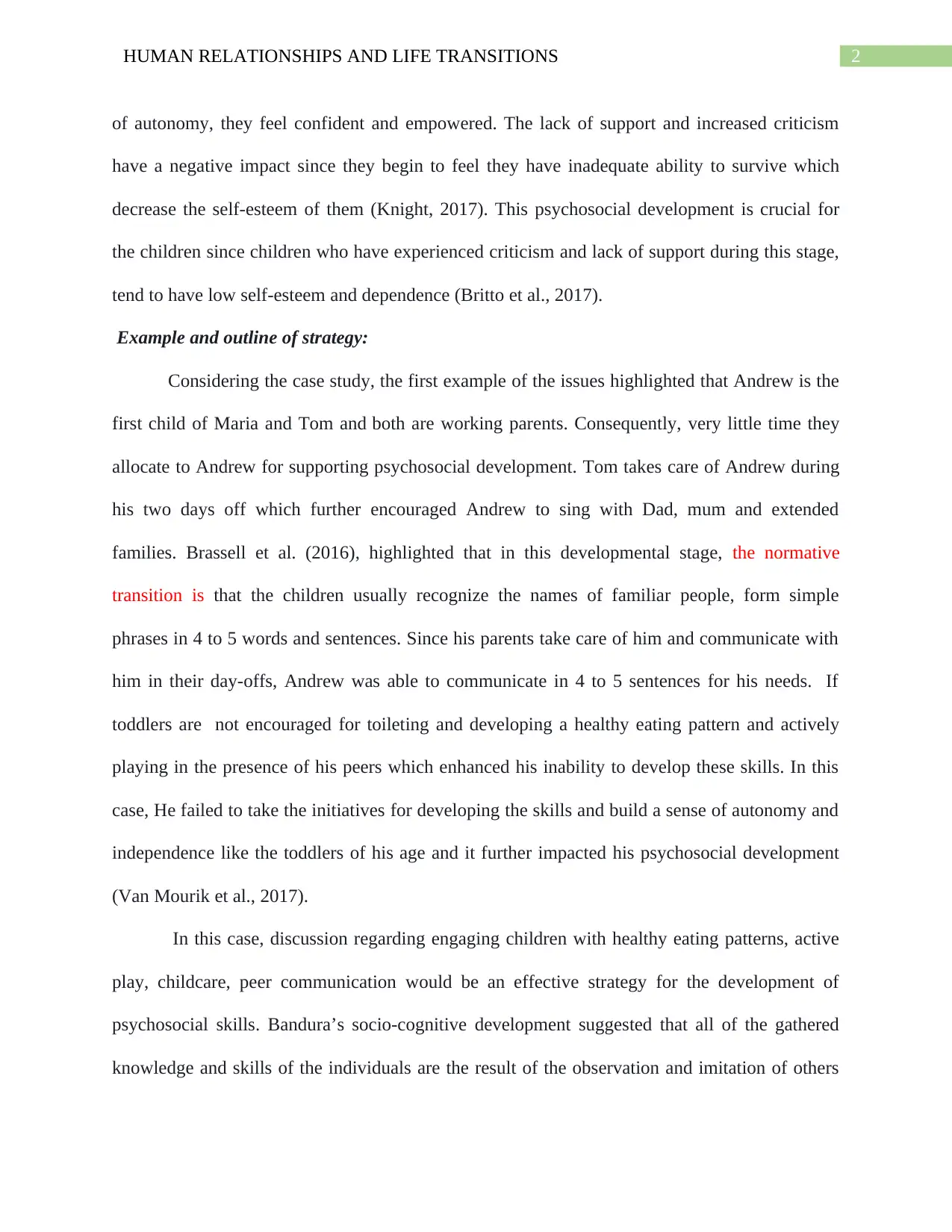
2HUMAN RELATIONSHIPS AND LIFE TRANSITIONS
of autonomy, they feel confident and empowered. The lack of support and increased criticism
have a negative impact since they begin to feel they have inadequate ability to survive which
decrease the self-esteem of them (Knight, 2017). This psychosocial development is crucial for
the children since children who have experienced criticism and lack of support during this stage,
tend to have low self-esteem and dependence (Britto et al., 2017).
Example and outline of strategy:
Considering the case study, the first example of the issues highlighted that Andrew is the
first child of Maria and Tom and both are working parents. Consequently, very little time they
allocate to Andrew for supporting psychosocial development. Tom takes care of Andrew during
his two days off which further encouraged Andrew to sing with Dad, mum and extended
families. Brassell et al. (2016), highlighted that in this developmental stage, the normative
transition is that the children usually recognize the names of familiar people, form simple
phrases in 4 to 5 words and sentences. Since his parents take care of him and communicate with
him in their day-offs, Andrew was able to communicate in 4 to 5 sentences for his needs. If
toddlers are not encouraged for toileting and developing a healthy eating pattern and actively
playing in the presence of his peers which enhanced his inability to develop these skills. In this
case, He failed to take the initiatives for developing the skills and build a sense of autonomy and
independence like the toddlers of his age and it further impacted his psychosocial development
(Van Mourik et al., 2017).
In this case, discussion regarding engaging children with healthy eating patterns, active
play, childcare, peer communication would be an effective strategy for the development of
psychosocial skills. Bandura’s socio-cognitive development suggested that all of the gathered
knowledge and skills of the individuals are the result of the observation and imitation of others
of autonomy, they feel confident and empowered. The lack of support and increased criticism
have a negative impact since they begin to feel they have inadequate ability to survive which
decrease the self-esteem of them (Knight, 2017). This psychosocial development is crucial for
the children since children who have experienced criticism and lack of support during this stage,
tend to have low self-esteem and dependence (Britto et al., 2017).
Example and outline of strategy:
Considering the case study, the first example of the issues highlighted that Andrew is the
first child of Maria and Tom and both are working parents. Consequently, very little time they
allocate to Andrew for supporting psychosocial development. Tom takes care of Andrew during
his two days off which further encouraged Andrew to sing with Dad, mum and extended
families. Brassell et al. (2016), highlighted that in this developmental stage, the normative
transition is that the children usually recognize the names of familiar people, form simple
phrases in 4 to 5 words and sentences. Since his parents take care of him and communicate with
him in their day-offs, Andrew was able to communicate in 4 to 5 sentences for his needs. If
toddlers are not encouraged for toileting and developing a healthy eating pattern and actively
playing in the presence of his peers which enhanced his inability to develop these skills. In this
case, He failed to take the initiatives for developing the skills and build a sense of autonomy and
independence like the toddlers of his age and it further impacted his psychosocial development
(Van Mourik et al., 2017).
In this case, discussion regarding engaging children with healthy eating patterns, active
play, childcare, peer communication would be an effective strategy for the development of
psychosocial skills. Bandura’s socio-cognitive development suggested that all of the gathered
knowledge and skills of the individuals are the result of the observation and imitation of others
⊘ This is a preview!⊘
Do you want full access?
Subscribe today to unlock all pages.

Trusted by 1+ million students worldwide
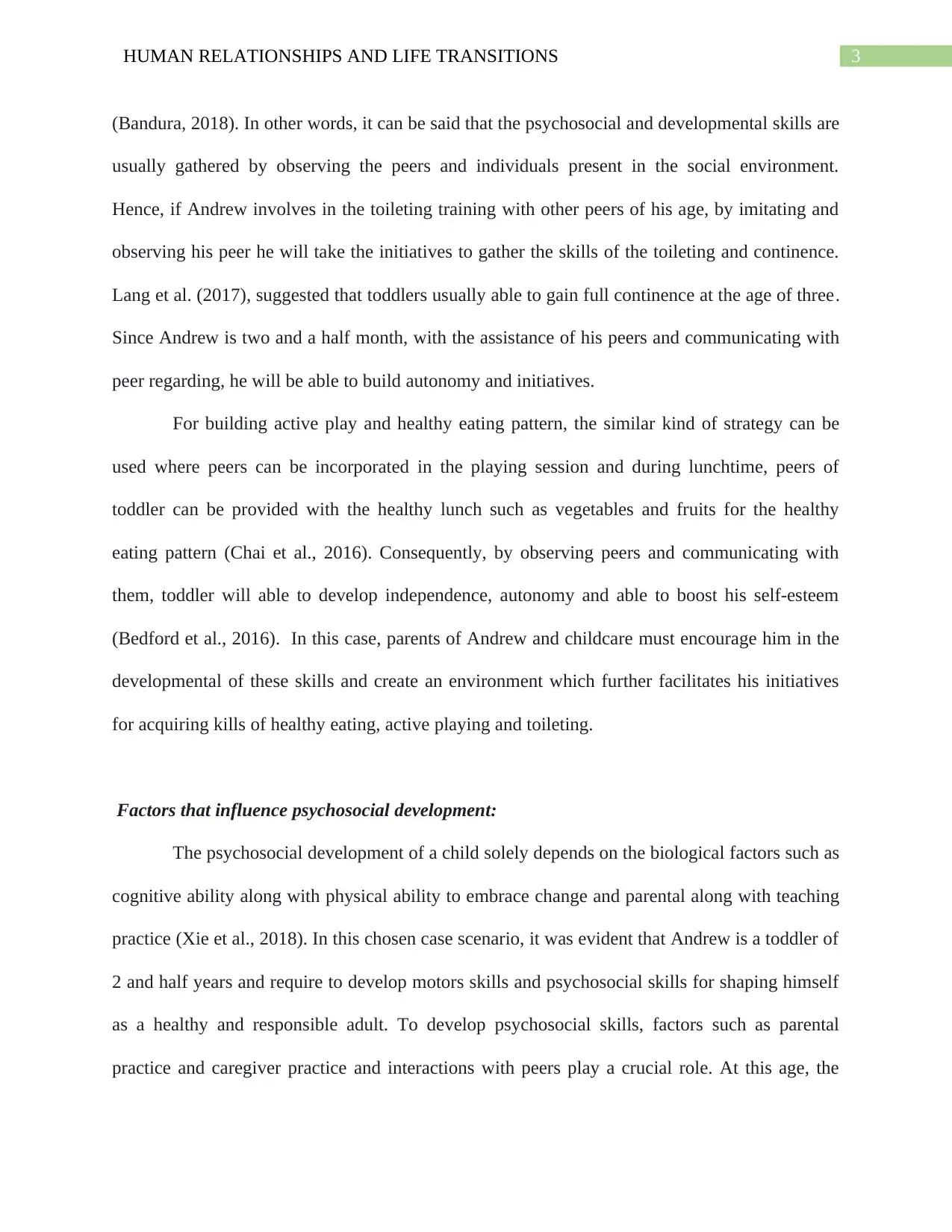
3HUMAN RELATIONSHIPS AND LIFE TRANSITIONS
(Bandura, 2018). In other words, it can be said that the psychosocial and developmental skills are
usually gathered by observing the peers and individuals present in the social environment.
Hence, if Andrew involves in the toileting training with other peers of his age, by imitating and
observing his peer he will take the initiatives to gather the skills of the toileting and continence.
Lang et al. (2017), suggested that toddlers usually able to gain full continence at the age of three.
Since Andrew is two and a half month, with the assistance of his peers and communicating with
peer regarding, he will be able to build autonomy and initiatives.
For building active play and healthy eating pattern, the similar kind of strategy can be
used where peers can be incorporated in the playing session and during lunchtime, peers of
toddler can be provided with the healthy lunch such as vegetables and fruits for the healthy
eating pattern (Chai et al., 2016). Consequently, by observing peers and communicating with
them, toddler will able to develop independence, autonomy and able to boost his self-esteem
(Bedford et al., 2016). In this case, parents of Andrew and childcare must encourage him in the
developmental of these skills and create an environment which further facilitates his initiatives
for acquiring kills of healthy eating, active playing and toileting.
Factors that influence psychosocial development:
The psychosocial development of a child solely depends on the biological factors such as
cognitive ability along with physical ability to embrace change and parental along with teaching
practice (Xie et al., 2018). In this chosen case scenario, it was evident that Andrew is a toddler of
2 and half years and require to develop motors skills and psychosocial skills for shaping himself
as a healthy and responsible adult. To develop psychosocial skills, factors such as parental
practice and caregiver practice and interactions with peers play a crucial role. At this age, the
(Bandura, 2018). In other words, it can be said that the psychosocial and developmental skills are
usually gathered by observing the peers and individuals present in the social environment.
Hence, if Andrew involves in the toileting training with other peers of his age, by imitating and
observing his peer he will take the initiatives to gather the skills of the toileting and continence.
Lang et al. (2017), suggested that toddlers usually able to gain full continence at the age of three.
Since Andrew is two and a half month, with the assistance of his peers and communicating with
peer regarding, he will be able to build autonomy and initiatives.
For building active play and healthy eating pattern, the similar kind of strategy can be
used where peers can be incorporated in the playing session and during lunchtime, peers of
toddler can be provided with the healthy lunch such as vegetables and fruits for the healthy
eating pattern (Chai et al., 2016). Consequently, by observing peers and communicating with
them, toddler will able to develop independence, autonomy and able to boost his self-esteem
(Bedford et al., 2016). In this case, parents of Andrew and childcare must encourage him in the
developmental of these skills and create an environment which further facilitates his initiatives
for acquiring kills of healthy eating, active playing and toileting.
Factors that influence psychosocial development:
The psychosocial development of a child solely depends on the biological factors such as
cognitive ability along with physical ability to embrace change and parental along with teaching
practice (Xie et al., 2018). In this chosen case scenario, it was evident that Andrew is a toddler of
2 and half years and require to develop motors skills and psychosocial skills for shaping himself
as a healthy and responsible adult. To develop psychosocial skills, factors such as parental
practice and caregiver practice and interactions with peers play a crucial role. At this age, the
Paraphrase This Document
Need a fresh take? Get an instant paraphrase of this document with our AI Paraphraser
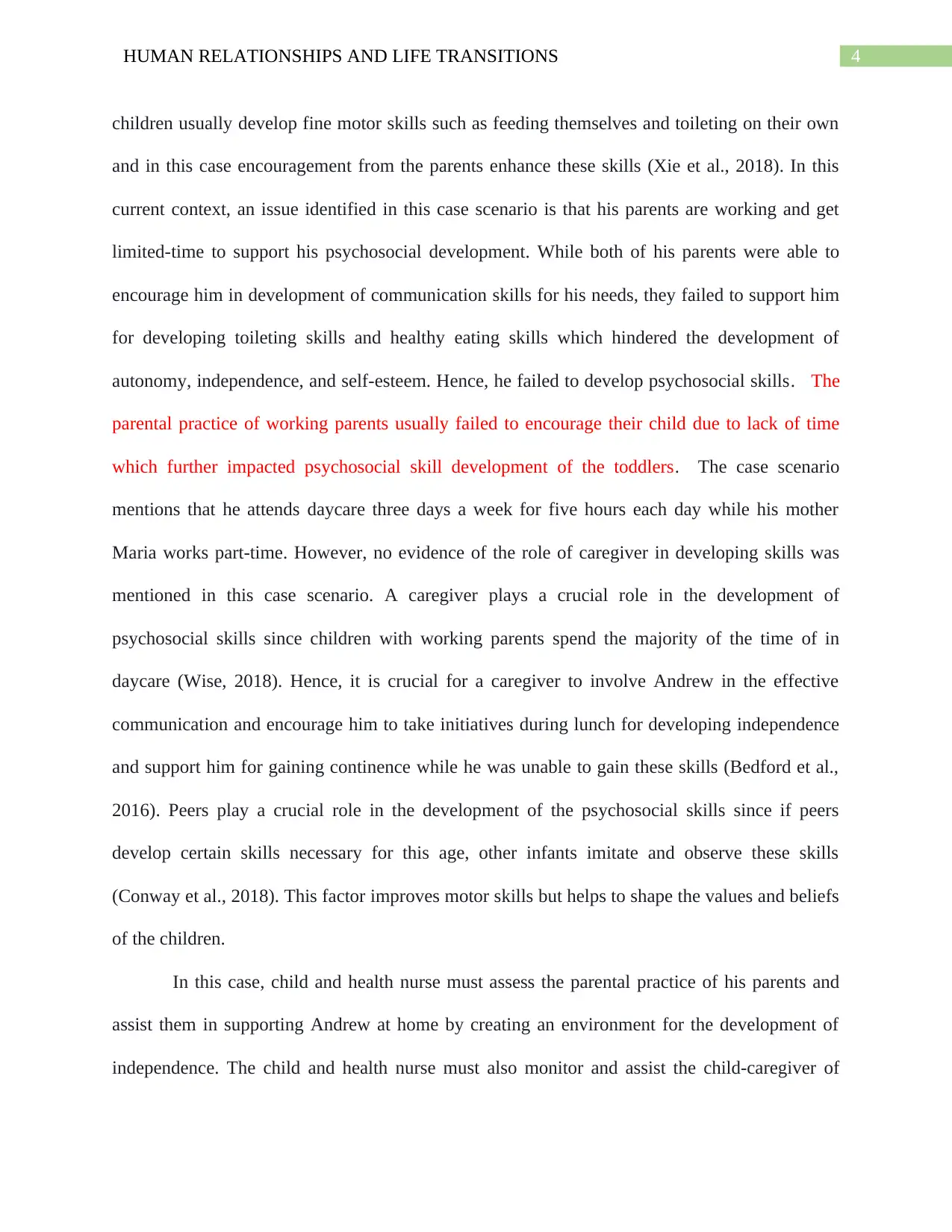
4HUMAN RELATIONSHIPS AND LIFE TRANSITIONS
children usually develop fine motor skills such as feeding themselves and toileting on their own
and in this case encouragement from the parents enhance these skills (Xie et al., 2018). In this
current context, an issue identified in this case scenario is that his parents are working and get
limited-time to support his psychosocial development. While both of his parents were able to
encourage him in development of communication skills for his needs, they failed to support him
for developing toileting skills and healthy eating skills which hindered the development of
autonomy, independence, and self-esteem. Hence, he failed to develop psychosocial skills. The
parental practice of working parents usually failed to encourage their child due to lack of time
which further impacted psychosocial skill development of the toddlers. The case scenario
mentions that he attends daycare three days a week for five hours each day while his mother
Maria works part-time. However, no evidence of the role of caregiver in developing skills was
mentioned in this case scenario. A caregiver plays a crucial role in the development of
psychosocial skills since children with working parents spend the majority of the time of in
daycare (Wise, 2018). Hence, it is crucial for a caregiver to involve Andrew in the effective
communication and encourage him to take initiatives during lunch for developing independence
and support him for gaining continence while he was unable to gain these skills (Bedford et al.,
2016). Peers play a crucial role in the development of the psychosocial skills since if peers
develop certain skills necessary for this age, other infants imitate and observe these skills
(Conway et al., 2018). This factor improves motor skills but helps to shape the values and beliefs
of the children.
In this case, child and health nurse must assess the parental practice of his parents and
assist them in supporting Andrew at home by creating an environment for the development of
independence. The child and health nurse must also monitor and assist the child-caregiver of
children usually develop fine motor skills such as feeding themselves and toileting on their own
and in this case encouragement from the parents enhance these skills (Xie et al., 2018). In this
current context, an issue identified in this case scenario is that his parents are working and get
limited-time to support his psychosocial development. While both of his parents were able to
encourage him in development of communication skills for his needs, they failed to support him
for developing toileting skills and healthy eating skills which hindered the development of
autonomy, independence, and self-esteem. Hence, he failed to develop psychosocial skills. The
parental practice of working parents usually failed to encourage their child due to lack of time
which further impacted psychosocial skill development of the toddlers. The case scenario
mentions that he attends daycare three days a week for five hours each day while his mother
Maria works part-time. However, no evidence of the role of caregiver in developing skills was
mentioned in this case scenario. A caregiver plays a crucial role in the development of
psychosocial skills since children with working parents spend the majority of the time of in
daycare (Wise, 2018). Hence, it is crucial for a caregiver to involve Andrew in the effective
communication and encourage him to take initiatives during lunch for developing independence
and support him for gaining continence while he was unable to gain these skills (Bedford et al.,
2016). Peers play a crucial role in the development of the psychosocial skills since if peers
develop certain skills necessary for this age, other infants imitate and observe these skills
(Conway et al., 2018). This factor improves motor skills but helps to shape the values and beliefs
of the children.
In this case, child and health nurse must assess the parental practice of his parents and
assist them in supporting Andrew at home by creating an environment for the development of
independence. The child and health nurse must also monitor and assist the child-caregiver of
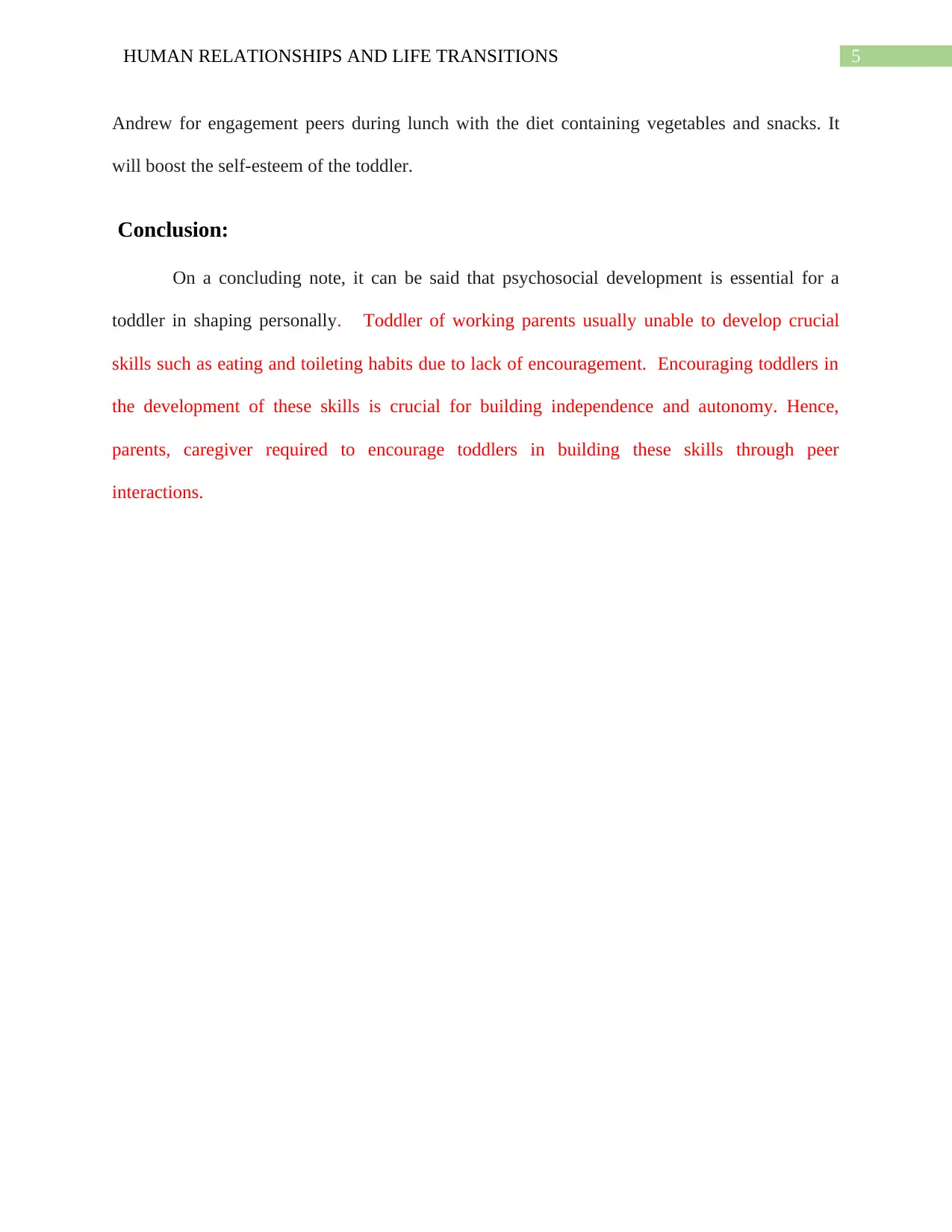
5HUMAN RELATIONSHIPS AND LIFE TRANSITIONS
Andrew for engagement peers during lunch with the diet containing vegetables and snacks. It
will boost the self-esteem of the toddler.
Conclusion:
On a concluding note, it can be said that psychosocial development is essential for a
toddler in shaping personally. Toddler of working parents usually unable to develop crucial
skills such as eating and toileting habits due to lack of encouragement. Encouraging toddlers in
the development of these skills is crucial for building independence and autonomy. Hence,
parents, caregiver required to encourage toddlers in building these skills through peer
interactions.
Andrew for engagement peers during lunch with the diet containing vegetables and snacks. It
will boost the self-esteem of the toddler.
Conclusion:
On a concluding note, it can be said that psychosocial development is essential for a
toddler in shaping personally. Toddler of working parents usually unable to develop crucial
skills such as eating and toileting habits due to lack of encouragement. Encouraging toddlers in
the development of these skills is crucial for building independence and autonomy. Hence,
parents, caregiver required to encourage toddlers in building these skills through peer
interactions.
⊘ This is a preview!⊘
Do you want full access?
Subscribe today to unlock all pages.

Trusted by 1+ million students worldwide
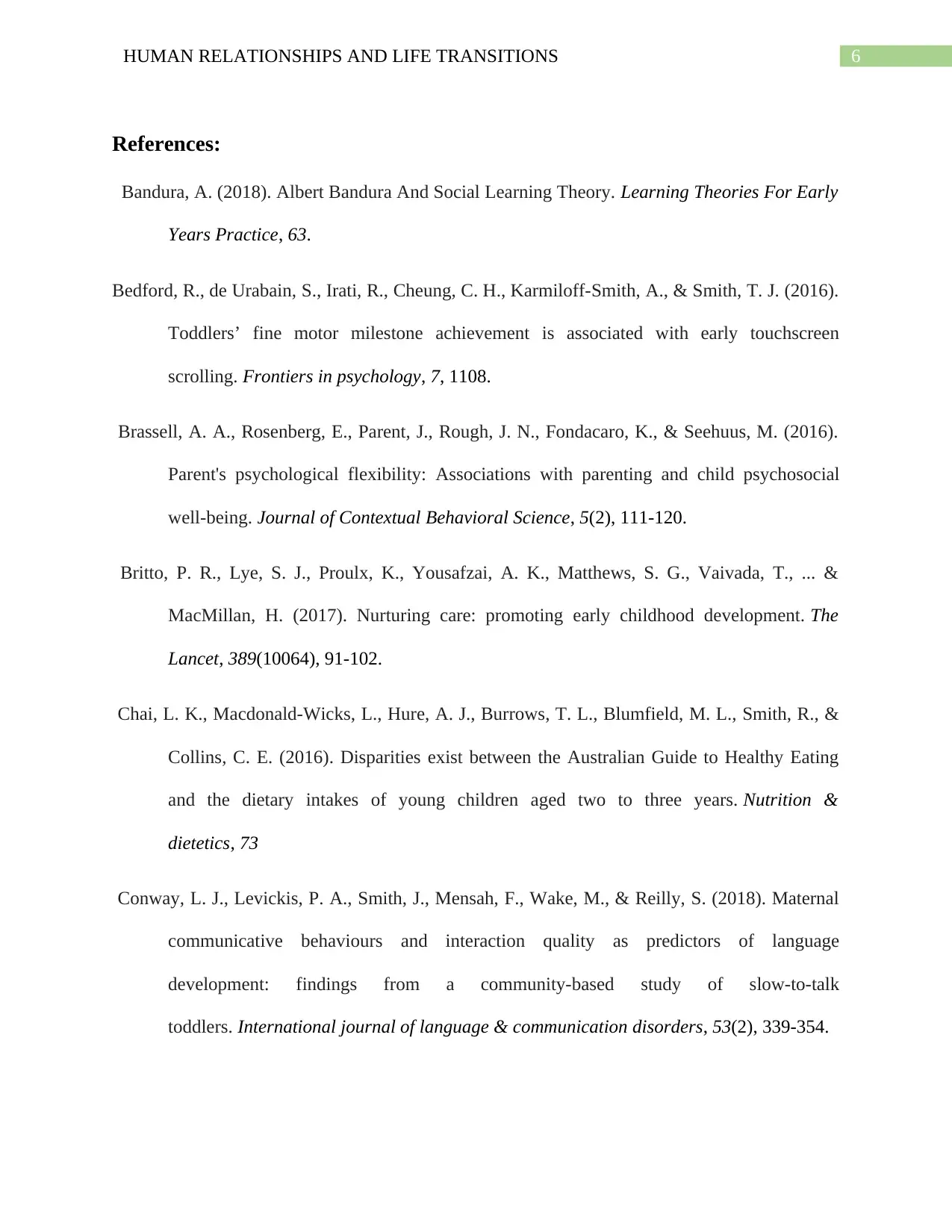
6HUMAN RELATIONSHIPS AND LIFE TRANSITIONS
References:
Bandura, A. (2018). Albert Bandura And Social Learning Theory. Learning Theories For Early
Years Practice, 63.
Bedford, R., de Urabain, S., Irati, R., Cheung, C. H., Karmiloff-Smith, A., & Smith, T. J. (2016).
Toddlers’ fine motor milestone achievement is associated with early touchscreen
scrolling. Frontiers in psychology, 7, 1108.
Brassell, A. A., Rosenberg, E., Parent, J., Rough, J. N., Fondacaro, K., & Seehuus, M. (2016).
Parent's psychological flexibility: Associations with parenting and child psychosocial
well-being. Journal of Contextual Behavioral Science, 5(2), 111-120.
Britto, P. R., Lye, S. J., Proulx, K., Yousafzai, A. K., Matthews, S. G., Vaivada, T., ... &
MacMillan, H. (2017). Nurturing care: promoting early childhood development. The
Lancet, 389(10064), 91-102.
Chai, L. K., Macdonald‐Wicks, L., Hure, A. J., Burrows, T. L., Blumfield, M. L., Smith, R., &
Collins, C. E. (2016). Disparities exist between the Australian Guide to Healthy Eating
and the dietary intakes of young children aged two to three years. Nutrition &
dietetics, 73
Conway, L. J., Levickis, P. A., Smith, J., Mensah, F., Wake, M., & Reilly, S. (2018). Maternal
communicative behaviours and interaction quality as predictors of language
development: findings from a community‐based study of slow‐to‐talk
toddlers. International journal of language & communication disorders, 53(2), 339-354.
References:
Bandura, A. (2018). Albert Bandura And Social Learning Theory. Learning Theories For Early
Years Practice, 63.
Bedford, R., de Urabain, S., Irati, R., Cheung, C. H., Karmiloff-Smith, A., & Smith, T. J. (2016).
Toddlers’ fine motor milestone achievement is associated with early touchscreen
scrolling. Frontiers in psychology, 7, 1108.
Brassell, A. A., Rosenberg, E., Parent, J., Rough, J. N., Fondacaro, K., & Seehuus, M. (2016).
Parent's psychological flexibility: Associations with parenting and child psychosocial
well-being. Journal of Contextual Behavioral Science, 5(2), 111-120.
Britto, P. R., Lye, S. J., Proulx, K., Yousafzai, A. K., Matthews, S. G., Vaivada, T., ... &
MacMillan, H. (2017). Nurturing care: promoting early childhood development. The
Lancet, 389(10064), 91-102.
Chai, L. K., Macdonald‐Wicks, L., Hure, A. J., Burrows, T. L., Blumfield, M. L., Smith, R., &
Collins, C. E. (2016). Disparities exist between the Australian Guide to Healthy Eating
and the dietary intakes of young children aged two to three years. Nutrition &
dietetics, 73
Conway, L. J., Levickis, P. A., Smith, J., Mensah, F., Wake, M., & Reilly, S. (2018). Maternal
communicative behaviours and interaction quality as predictors of language
development: findings from a community‐based study of slow‐to‐talk
toddlers. International journal of language & communication disorders, 53(2), 339-354.
Paraphrase This Document
Need a fresh take? Get an instant paraphrase of this document with our AI Paraphraser
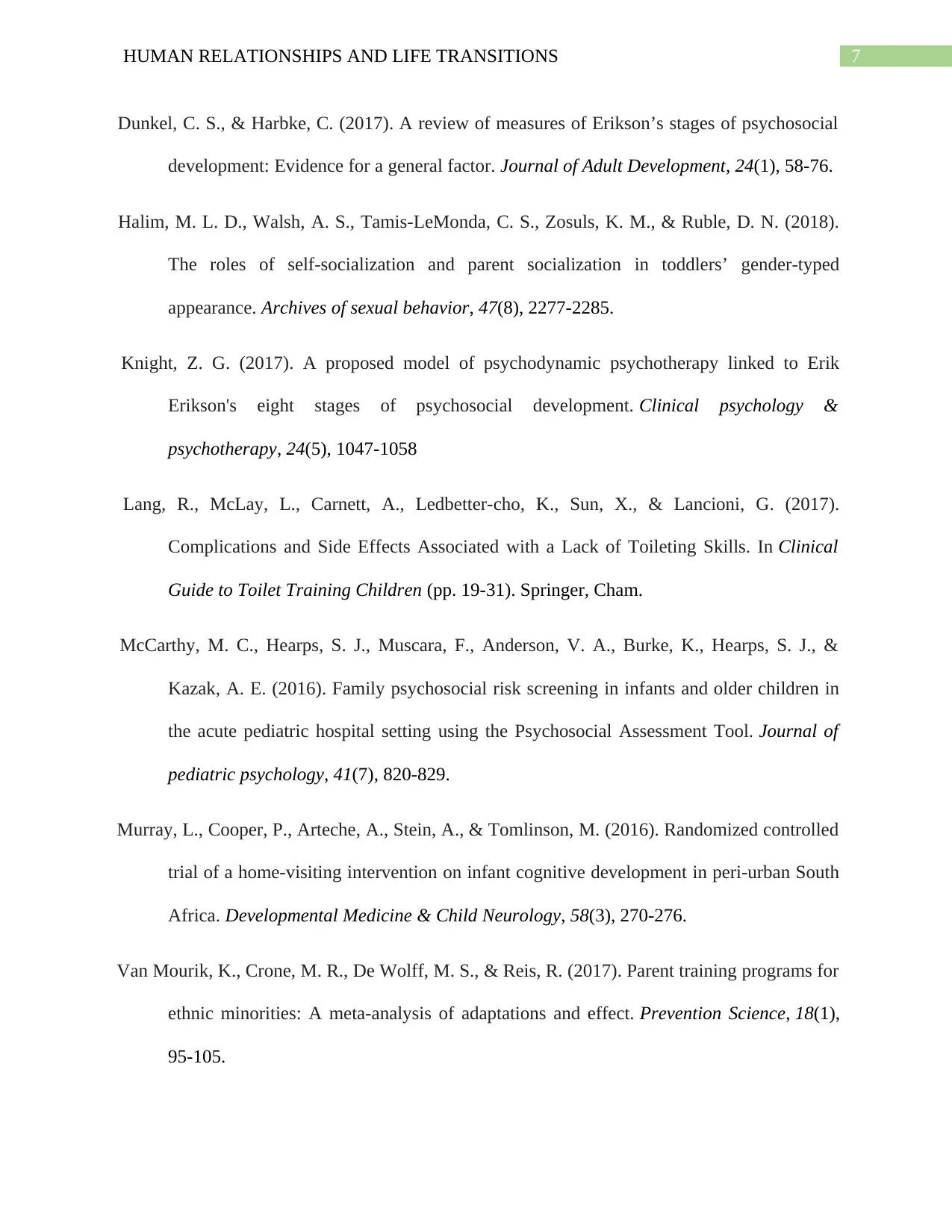
7HUMAN RELATIONSHIPS AND LIFE TRANSITIONS
Dunkel, C. S., & Harbke, C. (2017). A review of measures of Erikson’s stages of psychosocial
development: Evidence for a general factor. Journal of Adult Development, 24(1), 58-76.
Halim, M. L. D., Walsh, A. S., Tamis-LeMonda, C. S., Zosuls, K. M., & Ruble, D. N. (2018).
The roles of self-socialization and parent socialization in toddlers’ gender-typed
appearance. Archives of sexual behavior, 47(8), 2277-2285.
Knight, Z. G. (2017). A proposed model of psychodynamic psychotherapy linked to Erik
Erikson's eight stages of psychosocial development. Clinical psychology &
psychotherapy, 24(5), 1047-1058
Lang, R., McLay, L., Carnett, A., Ledbetter-cho, K., Sun, X., & Lancioni, G. (2017).
Complications and Side Effects Associated with a Lack of Toileting Skills. In Clinical
Guide to Toilet Training Children (pp. 19-31). Springer, Cham.
McCarthy, M. C., Hearps, S. J., Muscara, F., Anderson, V. A., Burke, K., Hearps, S. J., &
Kazak, A. E. (2016). Family psychosocial risk screening in infants and older children in
the acute pediatric hospital setting using the Psychosocial Assessment Tool. Journal of
pediatric psychology, 41(7), 820-829.
Murray, L., Cooper, P., Arteche, A., Stein, A., & Tomlinson, M. (2016). Randomized controlled
trial of a home‐visiting intervention on infant cognitive development in peri‐urban South
Africa. Developmental Medicine & Child Neurology, 58(3), 270-276.
Van Mourik, K., Crone, M. R., De Wolff, M. S., & Reis, R. (2017). Parent training programs for
ethnic minorities: A meta-analysis of adaptations and effect. Prevention Science, 18(1),
95-105.
Dunkel, C. S., & Harbke, C. (2017). A review of measures of Erikson’s stages of psychosocial
development: Evidence for a general factor. Journal of Adult Development, 24(1), 58-76.
Halim, M. L. D., Walsh, A. S., Tamis-LeMonda, C. S., Zosuls, K. M., & Ruble, D. N. (2018).
The roles of self-socialization and parent socialization in toddlers’ gender-typed
appearance. Archives of sexual behavior, 47(8), 2277-2285.
Knight, Z. G. (2017). A proposed model of psychodynamic psychotherapy linked to Erik
Erikson's eight stages of psychosocial development. Clinical psychology &
psychotherapy, 24(5), 1047-1058
Lang, R., McLay, L., Carnett, A., Ledbetter-cho, K., Sun, X., & Lancioni, G. (2017).
Complications and Side Effects Associated with a Lack of Toileting Skills. In Clinical
Guide to Toilet Training Children (pp. 19-31). Springer, Cham.
McCarthy, M. C., Hearps, S. J., Muscara, F., Anderson, V. A., Burke, K., Hearps, S. J., &
Kazak, A. E. (2016). Family psychosocial risk screening in infants and older children in
the acute pediatric hospital setting using the Psychosocial Assessment Tool. Journal of
pediatric psychology, 41(7), 820-829.
Murray, L., Cooper, P., Arteche, A., Stein, A., & Tomlinson, M. (2016). Randomized controlled
trial of a home‐visiting intervention on infant cognitive development in peri‐urban South
Africa. Developmental Medicine & Child Neurology, 58(3), 270-276.
Van Mourik, K., Crone, M. R., De Wolff, M. S., & Reis, R. (2017). Parent training programs for
ethnic minorities: A meta-analysis of adaptations and effect. Prevention Science, 18(1),
95-105.
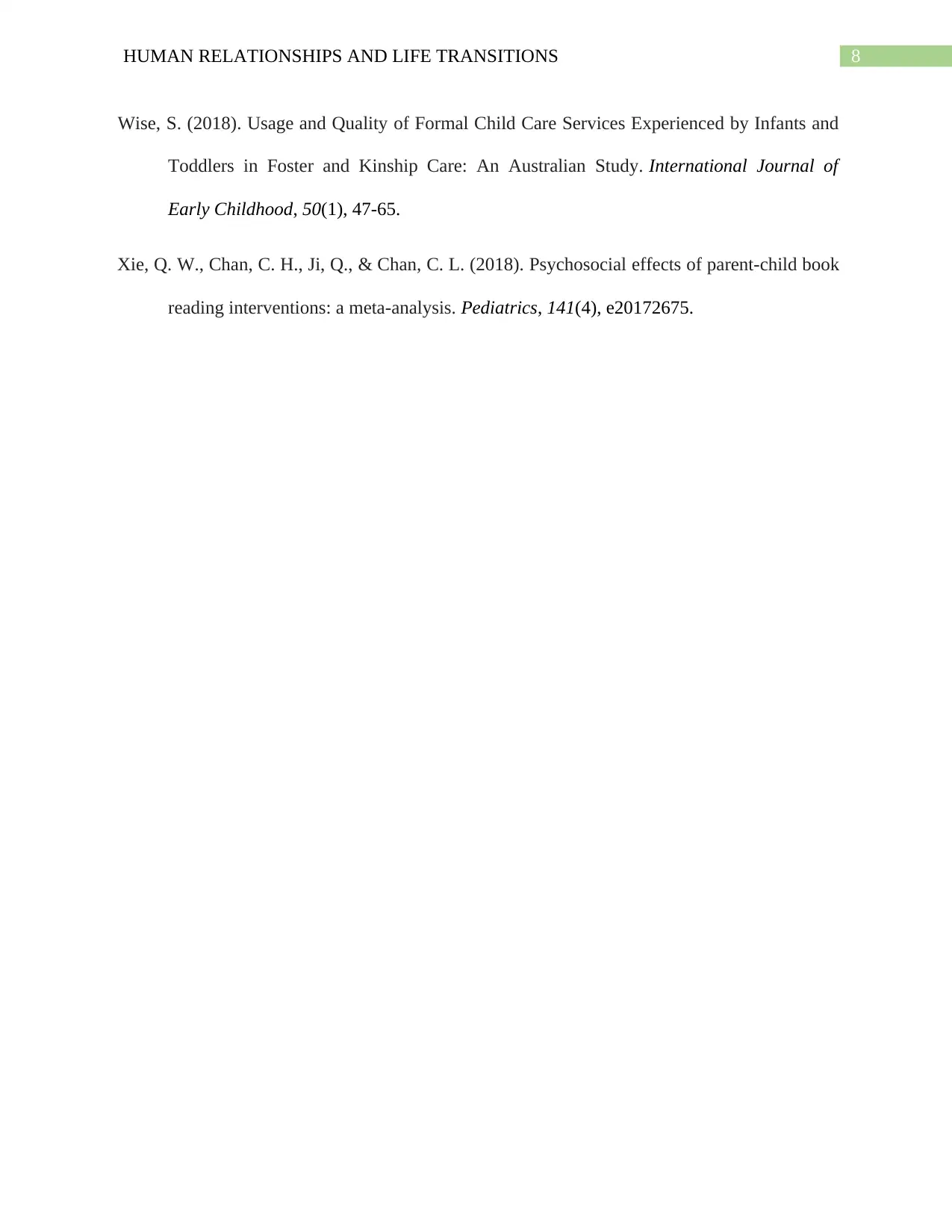
8HUMAN RELATIONSHIPS AND LIFE TRANSITIONS
Wise, S. (2018). Usage and Quality of Formal Child Care Services Experienced by Infants and
Toddlers in Foster and Kinship Care: An Australian Study. International Journal of
Early Childhood, 50(1), 47-65.
Xie, Q. W., Chan, C. H., Ji, Q., & Chan, C. L. (2018). Psychosocial effects of parent-child book
reading interventions: a meta-analysis. Pediatrics, 141(4), e20172675.
Wise, S. (2018). Usage and Quality of Formal Child Care Services Experienced by Infants and
Toddlers in Foster and Kinship Care: An Australian Study. International Journal of
Early Childhood, 50(1), 47-65.
Xie, Q. W., Chan, C. H., Ji, Q., & Chan, C. L. (2018). Psychosocial effects of parent-child book
reading interventions: a meta-analysis. Pediatrics, 141(4), e20172675.
⊘ This is a preview!⊘
Do you want full access?
Subscribe today to unlock all pages.

Trusted by 1+ million students worldwide
1 out of 9
Related Documents
Your All-in-One AI-Powered Toolkit for Academic Success.
+13062052269
info@desklib.com
Available 24*7 on WhatsApp / Email
![[object Object]](/_next/static/media/star-bottom.7253800d.svg)
Unlock your academic potential
Copyright © 2020–2026 A2Z Services. All Rights Reserved. Developed and managed by ZUCOL.





